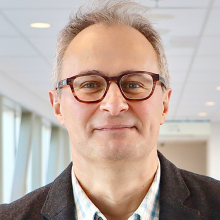Maziar Divangahi

PhD
Dr. Maziar Divangahi is a Harvard-trained pulmonary immunologist and an internationally recognized expert in immunity to two major lung infections, Mycobacterium tuberculosis and influenza virus (e.g. H1N1), which pose serious threats to human health. He is a Professor of Medicine at McGill University, Associate Director of the Meakins-Christie Laboratories and the co-leader of the RESP Program at the RI-MUHC. Additionally, he is an Associate Director of the McGill International TB Centre, and Associate Member of the Departments of Microbiology & Immunology and Pathology. Throughout his career, he has published in outstanding journals and received numerous awards, including a CIHR New Investigator Award, FRQS Award and, most recently, the CIHR Foundation Grant. His scholarly work has been recognized by election to the Royal Society of Canada, and he is currently holding the Strauss Chair in Respiratory Diseases. He is actively involved in developing the respiratory research training program at the MUHC to foster the mentoring and future success of the next generation of respiratory scientists.
Meakins-Christie Profile: Our lab focuses on investigating the cellular and molecular mechanisms involved in the cross-talk between innate and adaptive immunity to major pulmonary infectious diseases, such as influenza and tuberculosis. Host survival during infection in vital organs, such as the lung, requires a delicate balance between host resistance, which is essential for detecting and eliminating the pathogens, and disease tolerance, which is critical in minimizing collateral tissue damage. We are also investigating how to harness the power of innate immunity in vaccine via reprogramming of hematopoietic stem cells. In summary, understanding the regulatory mechanisms involved in both host-resistance and tolerance is essential for the future development of an effective therapy or vaccine.